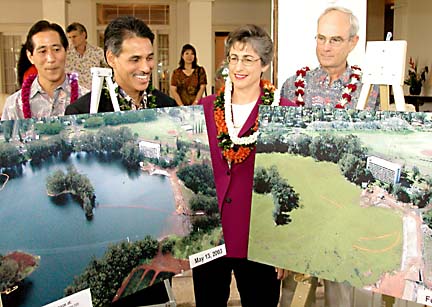
CRAIG T. KOJIMA / CKOJIMA@STARBULLETIN.COM
Gov. Linda Lingle threw a party yesterday thanking a task force for its cooperation in clearing Lake Wilson of Salvinia molesta. State Chief Engineer Eric T. Hirano, left, and Lt. Gov. James "Duke" Aiona stood near a photo of Lake Wilson as it looked after the cleanup, while Lingle and Department of Land and Natural Resources Director Peter Young stood near a photo of the lake with the water weed still covering it.
Gov praises
Lake Wilson cleanupLingle says the battle against a waterweed
showed the state can fight invasive species
Gov. Linda Lingle threw a thank-you party yesterday for the people who helped loosen the weed Salvinia molesta's stranglehold on Lake Wilson.
And she said the cooperative spirit that was shown in fighting the weed would be harnessed to fight other invasive species before they got so bad.
"We can rise to the challenge," Lingle said as she praised the nearly 300 state, city, community and military workers who in less than three months took the lake from more than 95 percent covered with the invasive waterweed to almost clear. The work involved herbicide spraying and laborious removal with boats, booms and huge excavators.
But, the governor told the noontime gathering at Washington Place, "We don't want to have to rise to this kind of challenge again."
Lingle recalled that soon after she took office, someone put a photograph on her desk to show her the problem on the Central Oahu lake.
Seeing what looked like a vast green meadow, "I said 'Yes, but where's the lake,'" Lingle joked.
Peter Young, director of the state Department of Land and Natural Resources, told the workers as they munched on kalua pig and sushi, "We appreciate all the work you all have done for us,"
It was a task, he reminded them, "that some thought would never be accomplished."
Wahiawa State Freshwater Park, which has been closed almost three months while it was used as a staging area for the waterweed battle, will reopen today, Young announced. Boating on the lake will be allowed at a time to be announced in June.
"Thank God for Salvinia," said Mike Buck, administrator of the Division of Forestry and Wildlife, who believes the high visibility of the Salvinia problem on Lake Wilson drew attention to the problem of invasive species.
Lingle signed two bills yesterday to fight against invasive species, which are generally defined as non-native plants or animals that cause harm to the state's ecosystem or economy.
Senate Bill 1505 establishes an Invasive Species Council, which will consist of the heads of the state departments of Land and Natural Resources; Agriculture; Health; Transportation; Commerce and Consumer Affairs; Business, Economic Development and Tourism; Defense; and Hawaiian Homelands.
The group will seek better interdepartmental coordination in facing threats such as the plant miconia and coqui frogs. It also will work with the Coordinating Group on Alien Species and the Invasive Species Councils on each island.
Senate Bill 552 encourages private landowners to allow state and volunteer workers to enter their land to remove invasive species by limiting their liability.
"This is not just a DLNR or an Ag issue," said Buck, who has served three years on the National Invasive Species Advisory Committee. "We've got to get business and transportation involved."
The battle at Lake Wilson is over, Buck said, but the war is not won.
"Compared to miconia, Salvinia's a walk in the park."
